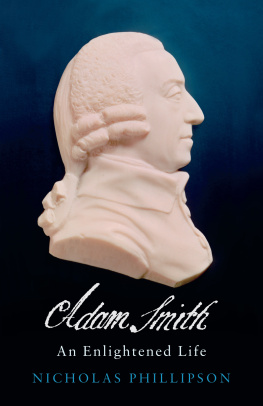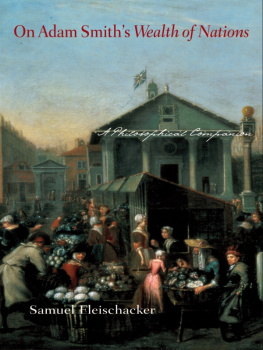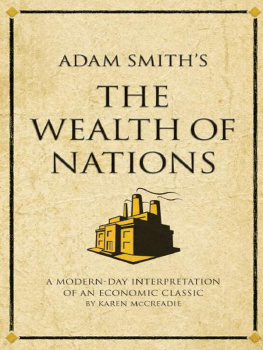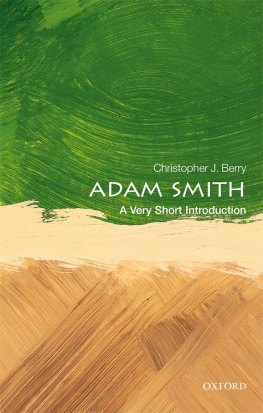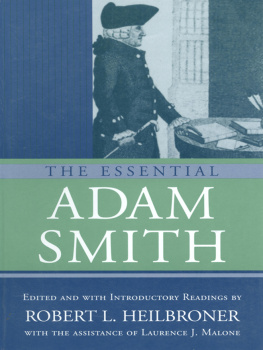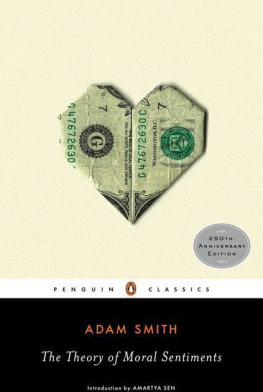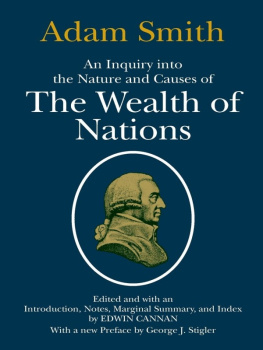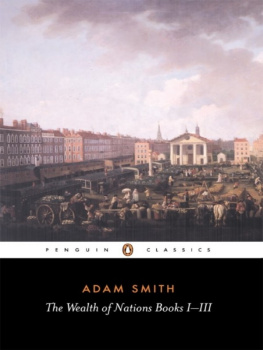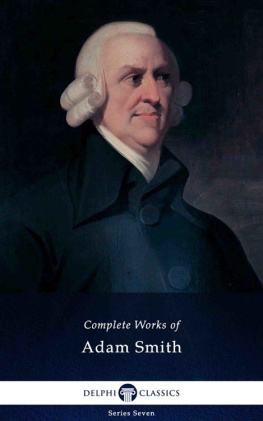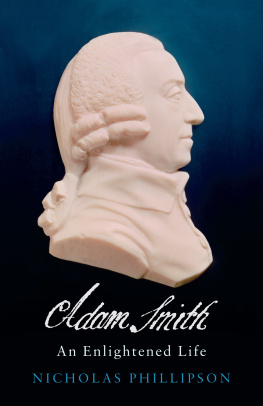Smith Adam - Adam Smith: An Enlightened Life
Here you can read online Smith Adam - Adam Smith: An Enlightened Life full text of the book (entire story) in english for free. Download pdf and epub, get meaning, cover and reviews about this ebook. City: London;Great Britain;Scotland, year: 2010, publisher: Penguin;Allen Lane, genre: Religion. Description of the work, (preface) as well as reviews are available. Best literature library LitArk.com created for fans of good reading and offers a wide selection of genres:
Romance novel
Science fiction
Adventure
Detective
Science
History
Home and family
Prose
Art
Politics
Computer
Non-fiction
Religion
Business
Children
Humor
Choose a favorite category and find really read worthwhile books. Enjoy immersion in the world of imagination, feel the emotions of the characters or learn something new for yourself, make an fascinating discovery.
- Book:Adam Smith: An Enlightened Life
- Author:
- Publisher:Penguin;Allen Lane
- Genre:
- Year:2010
- City:London;Great Britain;Scotland
- Rating:5 / 5
- Favourites:Add to favourites
- Your mark:
Adam Smith: An Enlightened Life: summary, description and annotation
We offer to read an annotation, description, summary or preface (depends on what the author of the book "Adam Smith: An Enlightened Life" wrote himself). If you haven't found the necessary information about the book — write in the comments, we will try to find it.
Adam Smith is celebrated all over the world as the author of The Wealth of Nations and the founder of modern economics. A few of his ideas - that of the Invisible Hand of the market and that It is not from the benevolence of the butcher, the brewer, or the baker that we expect our dinner, but from their regard to their own interest - have become icons of the modern world. Yet Smith saw himself primarily as a philosopher rather than an economist, and would never have predicted that the ideas for which he is now best known were his most important. This book, by one of the leading scholars of the Scottish Enlightenment, shows the extent to which The Wealth of Nations and Smiths other great work, The Theory of Moral Sentiments, were part of a larger scheme to establish a grand Science of Man, one of the most ambitious projects of the European Enlightenment, which was to encompass law, history and aesthetics as well as economics and ethics.
Nicholas Phillipson reconstructs Smiths intellectual ancestry and formation, of which he gives a radically new and convincing account. He shows what Smith took from, and what he gave to, the rapidly changing and subtly different intellectual and commercial cultures of Glasgow and Edinburgh as they entered the great years of the Scottish Enlightenment. Above all he explains how far Smiths ideas developed in dialogue with those of his closest friend, the other titan of the age, David Hume. This superb biography is now the one book which anyone interested in the founder of economics must read.
ReviewA fascinating book. . . . Adam Smith finally has the biography that he deserves, and it could not be more timely.Jeffrey Collins, Wall Street Journal
(Jeffrey Collins Wall Street Journal )
An unabashedly intellectual biography . . . [written] in graceful prose. . . . For all that subsequent generations, no less our own, have taken from Smiths economic contributions, it is indeed enlightening to understand the broader sweep of his vision.--Nancy F. Koehn, New York Times (Nancy F. Koehn New York Times )
Lively [and] well-observed. . . . It would take a skilful pencil to bring Smith to life, warned one of his friends. In bringing Smiths ideas to life, Phillipson shows that his pencilwork is skilful indeed. The Economist (The Economist )
Remarkable, often brilliant. . . stuffed with acute philosophical observations. But no less fascinating is the portrait of the milieu in which Smith lived. . . . Phillipsons exposition of [Smiths] enlightened life can scarcely be bettered.The Times (London)
(The Times (London) )
[Nicholas Phillipson] tries, very successfully, to pull together the two Smiths, letting us see how the man of feeling became the little god of finance. . . making it plain that Smith was more moral-man than market-man.Adam Gopnik, The New Yorker
(Adam Gopnik The New Yorker 20101018)
One good reason to read Nicholas Phillipsonsexcellent intellectual biography is to gain a more nuanced understanding of Smith and, inparticular, of his vision of an all-embracing science of man.. . . When Phillipson discusses The Wealth of Nations, its hard not to discern parallels between Smiths time and our own.Michael Dirda, Washington Post
(Michael Dirda Washington Post )
This year, my favorite business book was Nicholas Phillipsons biography of Adam Smith. It showed that Smith is still the greatest economist of all time, wise about human nature, and that he understands the power of capitalism.Tyler Cowen, NPRs Marketplace
(Tyler Cowen NPRs Marketplace )
Named a Favorite Business Book of 2010 by James Pressley, Bloomberg BusinessWeek (James Pressley Bloomberg Business Week )
Named a Best Book of 2010 by the Atlantic (Atlantic Monthly )
Named a Critics Favorite Book of 2010The New Yorker (New Yorker )
Named a Best Business Book of 2010 by Tyler Cowen, NPRs Marketplace (Tyler Cowen NPRs Marketplace )
In a feast of both writing and erudition, Nicholas Phillipson has recreated the intellectual and mercantile world of Adam Smith, and shows how it shaped Smiths two masterpieces, the Theory of Moral Sentiments and the Wealth of Nations. He sets Smiths economics firmly in the philosophy of the Scottish Enlightenment and especially of his great friend David Hume and argues compellingly that for Smith material improvement was not an end in itself, but a necessary condition for human ennoblement, which was the grand aim of his lifes work. A wonderful, thought-provoking book.Robert Skidelsky, biographer of John Maynard Keynes
(Robert Skidelsky )
Nicholas Phillipsons lifelong study of Adam Smith has been well worth waiting for. Phillipson treats Smiths The Wealth of Nations as the sequel to his Theory of Moral Sentiments. Political economy and the history of society were handmaids to the moral philosophy which Enlightenment thinkers intended as the replacement of religion. This story has never been better told than in this deeply sympathetic biography of an intellectually ambitious but personally modest man, and it is a superb portrait of the Scotland, Britain and Europe he lived in. J.G.A. Pocock, Johns Hopkins University
(J.G.A. Pocock )
This stylish biography brings to life Adam Smiths breathtaking ambition to create a Science of Man. Phillipsons elegant prose and erudition make clear the necessary relationship between Smiths moral philosophy and his political economy. The reader is left with a deeper appreciation for Smiths project and for the eighteenth-century Scottish world in which he lived. This book is both a delight to read and agenda-setting. A real achievement!Steve Pincus, Yale University
(Steve Pincus )
This is easily the best book on Smith Ive read: a wonderfully accessible, thoroughly researched, full-bodied drama examining the philosopher and economist. Phillipsons biography presents Smith as a living personality, not just an imposing intellect, tracking his social, economic, and political moves from his birthplace Kirkcaldy, to Glasgow and Oxford, through his various lectures and professorships, travels around Europe, preparation of The Wealth of Nations, and finally to his work for the government. In doing so, it makes a strong case for the importance and complexity perhaps primacy of the Scottish Enlightenment and the men who contributed to it. In clean and clear prose, Phillipson explains what Smith was writing and why he was writing it, whether moral philosophy, jurisprudence, rhetoric or political economy. This beguiling blend of Smiths intellection and experience should appeal to anyone interested in the making of the modern world.David Hancock, author of Oceans of Wine: Madeira and the Emergence of American Trade and Taste
(David Hancock )
[A] great achievement. . . . Few books have shed better light on what Smith meant and why he wrote as he did.Scotland on Sunday
(Scotland on Sunday )
The myth of Adam Smith is that he was the hard-nosed high priest of self-interested capitalism. [Phillipson] shows that his intellectual goals were far greater and nobler. . . . Phillipson has portrayed an Adam Smith for our times.New Statesman
(New Statesman )
The Smith who emerges from this thoughtful study. . . had an intellect of extraordinary brilliance, and it is the life of that intellect that is finely portrayed in this book.Sunday Telegraph (London)
(Sunday Telegraph (London) )
Phillipsons path-breaking biography shines new light on the complex development of this much-misunderstood thinker.The Independent (London)
(The Independent (London) )
Phillipson has been studying [the Scottish Enlightenment], this explosion of genius, all his life, and is a trustworthy guide to the life of Adam Smith.Financial Times
(Financial Times )
Having failed so royally to predict or ameliorate our present distress, some economists may come to examine their assumptions and be drawn to this fine book and its mighty subject.The Guardian (London)
(The Guardian (London) )
Drawing on Smiths published works and student notes from his lectures, Phillipson shows how Smiths thinking on social theory and ethics influenced his system of economics. . . . what Phillipson calls a vast intellectual project. Bloomberg Business Week
(Bloomberg Business Week )
An unabashedly intellectual biography. . . . It is indeed enlightening to understand the broader sweep of [Adam Smiths] vision.Nancy F. Koehn, New York Times (Nancy F. Koehn New York Times )
An absorbing and elegant account of Smiths mind and of the Scottish context, social and intellectual, that produced it.Blair Worden, The Spectator (London)
(Blair Worden The Spectator )
For scholars. . . Adam Smith: An Enlightened Life should prove a very valuable resource. For more general audiences there is much to appreciate here--fine prose, erudite consideration of Enlightenment thought, and a consistently engaging narrative.PopMatters
(PopMatters )
Nicholas Phillipsons new biography, Adam Smith: An Enlightened Life, is a pleasure to read, and it provides us with a clear and thorough account of Smiths life.Samuel Fleischacker, Journal of British Studies
(Samuel Fleischacker Journal of British Studies )
Winner of the 2011-2013 Annibel Jenkins Prize, given by the American Society for the 18th Century Studies.
(2011-2013 Annibel Jenkins Prize American Society for the 18th Century Studies 20130125)
ReviewA fascinating book. . . . Adam Smith finally has the biography that he deserves, and it could not be more timely.Jeffrey Collins, Wall Street Journal
(Jeffrey Collins Wall Street Journal )
An unabashedly intellectual biography . . . [written] in graceful prose. . . . For all that subsequent generations, no less our own, have taken from Smiths economic contributions, it is indeed enlightening to understand the broader sweep of his vision.--Nancy F. Koehn, New York Times (Nancy F. Koehn New York Times )
Lively [and] well-observed. . . . It would take a skilful pencil to bring Smith to life, warned one of his friends. In bringing Smiths ideas to life, Phillipson shows that his pencilwork is skilful indeed. The Economist (The Economist )
Remarkable, often brilliant. . . stuffed with acute philosophical observations. But no less fascinating is the portrait of the milieu in which Smith lived. . . . Phillipsons exposition of [Smiths] enlightened life can scarcely be bettered.The Times (London)
(The Times (London) )
[Nicholas Phillipson] tries, very successfully, to pull together the two Smiths, letting us see how the man of feeling became the little god of finance. . . making it plain that Smith was more moral-man than market-man.Adam Gopnik, The New Yorker
(Adam Gopnik The New Yorker )
One good reason to read Nicholas Phillipsonsexcellent intellectual (Michael Dirda Washington Post )
This year, my favorite business book was Nicholas Phillipsons biography of Adam Smith. It showed that Smith is still the greatest economist of all time, wise about human nature, and that he understands the power of capitalism.Tyler Cowen, NPRs Marketplace
(Tyler Cowen NPRs Marketplace )
Named a Favorite Business Book of 2010 by James Pressley, Bloomberg BusinessWeek (James Pressley Bloomberg Business Week )
Named a Best Book of 2010 by the Atlantic (Atlantic Monthly )
Named a Critics Favorite Book of 2010The New Yorker (New Yorker )
Named a Best Business Book of 2010 by Tyler Cowen, NPRs Marketplace (Tyler Cowen NPRs Marketplace )
In a feast of both writing and erudition, Nicholas Phillipson has recreated the intellectual and mercantile world of Adam Smith, and shows how it shaped Smiths two masterpieces, the Theory of Moral Sentiments and the Wealth of Nations. He sets Smiths economics firmly in the philosophy of the Scottish Enlightenment and especially of his great friend David Hume and argues compellingly that for Smith material improvement was not an end in itself, but a necessary condition for human ennoblement, which was the grand aim of his lifes work. A wonderful, thought-provoking book.Robert Skidelsky, biographer of John Maynard Keynes
(Robert Skidelsky )
Nicholas Phillipsons lifelong study of Adam Smith has been well worth waiting for. Phillipson treats Smiths The Wealth of Nations as the sequel to his Theory of Moral Sentiments. Political economy and the history of society were handmaids to the moral philosophy which Enlightenment thinkers intended as the replacement of religion. This story has never been better told than in this deeply sympathetic biography of an intellectually ambitious but personally modest man, and it is a superb portrait of the Scotland, Britain and Europe he lived in. J.G.A. Pocock, Johns Hopkins University
(J.G.A. Pocock )
This stylish biography brings to life Adam Smiths breathtaking ambition to create a Science of Man. Phillipsons elegant prose and erudition make clear the necessary relationship between Smiths moral philosophy and his political economy. The reader is left with a deeper appreciation for Smiths project and for the eighteenth-century Scottish world in which he lived. This book is both a delight to read and agenda-setting. A real achievement!Steve Pincus, Yale University
(Steve Pincus )
This is easily the best book on Smith Ive read: a wonderfully accessible, thoroughly researched, full-bodied drama examining the philosopher and economist. Phillipsons biography presents Smith as a living personality, not just an imposing intellect, tracking his social, economic, and political moves from his birthplace Kirkcaldy, to Glasgow and Oxford, through his various lectures and professorships, travels around Europe, preparation of The Wealth of Nations, and finally to his work for the government. In doing so, it makes a strong case for the importance and complexity perhaps primacy of the Scottish Enlightenment and the men who contributed to it. In clean and clear prose, Phillipson explains what Smith was writing and why he was writing it, whether moral philosophy, jurisprudence, rhetoric or political economy. This beguiling blend of Smiths intellection and experience should appeal to anyone interested in the making of the modern world.David Hancock, author of Oceans of Wine: Madeira and the Emergence of American Trade and Taste
(David Hancock )
[A] great achievement. . . . Few books have shed better light on what Smith meant and why he wrote as he did.Scotland on Sunday
(Scotland on Sunday )
The myth of Adam Smith is that he was the hard-nosed high priest of self-interested capitalism. [Phillipson] shows that his intellectual goals were far greater and nobler. . . . Phillipson has portrayed an Adam Smith for our times.New Statesman
(New Statesman )
The Smith who emerges from this thoughtful study. . . had an intellect of extraordinary brilliance, and it is the life of that intellect that is finely portrayed in this book.Sunday Telegraph (London)
(Sunday Telegraph (London) )
Phillipsons path-breaking biography shines new light on the complex development of this much-misunderstood thinker.The Independent (London)
(The Independent (London) )
Phillipson has been studying [the Scottish Enlightenment], this explosion of genius, all his life, and is a trustworthy guide to the life of Adam Smith.Financial Times
(Financial Times )
Having failed so royally to predict or ameliorate our present distress, some economists may come to examine their assumptions and be drawn to this fine book and its mighty subject.The Guardian (London)
(The Guardian (London) )
Drawing on Smiths published works and student notes from his lectures, Phillipson shows how Smiths thinking on social theory and ethics influenced his system of economics. . . . what Phillipson calls a vast intellectual project. Bloomberg Business Week
(Bloomberg Business Week )
An unabashedly intellectual biography. . . . It is indeed enlightening to understand the broader sweep of [Adam Smiths] vision.Nancy F. Koehn, New York Times (Nancy F. Koehn New York Times )
An absorbing and elegant account of Smiths mind and of the Scottish context, social and intellectual, that produced it.Blair Worden, The Spectator (London)
(Blair Worden The Spectator )
For scholars. . . Adam Smith: An Enlightened Life should prove a very valuable resource. For more general audiences there is much to appreciate here--fine prose, erudite consideration of Enlightenment thought, and a consistently engaging narrative.PopMatters
(PopMatters )
Nicholas Phillipsons new biography, Adam Smith: An Enlightened Life, is a pleasure to read, and it provides us with a clear and thorough account of Smiths life.Samuel Fleischacker, Journal of British Studies
(Samuel Fleischacker Journal of British Studies )
Type : Biography
Smith Adam: author's other books
Who wrote Adam Smith: An Enlightened Life? Find out the surname, the name of the author of the book and a list of all author's works by series.

